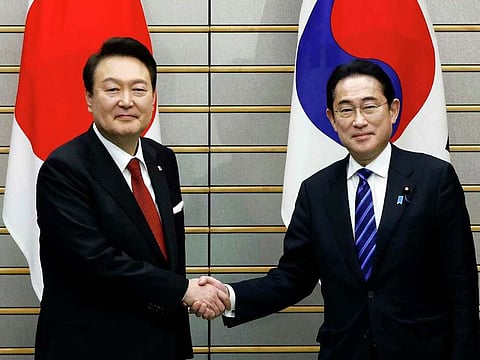South Korea and Japan improve collaboration, move past grievances
First bilateral visit by Korean leader to Japan in 12 years marks a significant milestone

South Korean President, Yoon Suk-yeol, making the first bilateral visit by a Korean leader to Japan in a dozen years will go a long way to improve their collaboration in a range of areas. These include economic security, advanced sciences and technologies, finance and military intelligence sharing.
Korea had nearly terminated their intelligence sharing agreement after Japan imposed export controls over semiconductor and display industry items to South Korea in 2019. Japan announced lifting of controls ahead of the visit.
By agreeing to initiate and revive a broad range of cooperative issues the two nations have hopefully, sought to put the acrimonious past behind them.
President Yoon represents People Power Party — a conservative outfit and had campaigned on improving relations with Japan and the US that had deteriorated under his centre left predecessor Moon Jae-in.
South Korea and Japan have a long history of tensions and mistrust, dating back to Japan’s colonisation of the Korean peninsula from 1910 to 1945. During this period, Japan reportedly forced Koreans to adopt Japanese culture and language, and many Koreans were allegedly subjected to forced labour and sexual slavery. These actions continue to be a major source of resentment and mistrust between the two countries.
Also Read: Why China-Australia relationship matters
Framework for economic cooperation
Despite numerous attempts at reconciliation, tensions between South Korea and Japan have persisted. One of the most significant of these attempts was the 1965 Treaty on Basic Relations between Japan and South Korea, which normalised relations between the two countries and established a framework for economic cooperation.
However, Korea claims that the treaty did not address the issue of compensation for the alleged wartime atrocities, and tensions have continued to simmer.
The Japanese argue that the 1965 Basic Treaty settled the colonial era issues between the two countries under which Japan provided millions of dollars in grants and loans in compensation for the alleged Japanese excesses during the colonisation era.
Seoul believes that the 1965 Treaty did not address these two questions adequately. The issues remained wrapped under strict military rule and were brought forth more in public domain after Korea democratised in 1987.
Their relations hit a low point in 2019 since the 1965 normalisation when Japan imposed export restrictions on key chemicals used in manufacturing semiconductors and smartphone screens in South Korea. This was in retaliation to a Korea’s Supreme Court ruling ordering Mitsubishi Heavy Industries and Nippon Steel to pay compensation to the surviving forced labourers.
Now President Yoon has agreed to compensate them. Polls in South Korea show 59 per cent of people oppose compensation to the forced labourers from funds generated within Korea — demanding compensation directly from Japan. The opposition Democratic Party considers the agreements as ‘surrender.’
With an overwhelming majority in Korea’s National Assembly, it is unlikely to go along with the measures to boost cooperation in the absence of more apologetic gestures from Japan.
Japanese Prime Minister Fumio Kishida faces factional pressures within his own Liberal Democratic Party. In the backdrop of what has happened to the previous agreements it is still a question how PM Kishida will build basis of a more sustainable and a balanced relationship that receives public acceptance in both countries.
Reasons for optimism
Despite their history of tensions, South Korea and Japan have much to gain from cooperation. Both countries are major economic powers and leaders in technology and innovation, and their cooperation could lead to significant economic benefits for both countries.
The United States has a major stake in the relationship between South Korea and Japan. Both countries are key allies of the United States in the region, and both host thousands of American troops on their soil. Their cooperation is needed by the US in maintaining regional dominance. The US has urged both countries to put aside their differences and work together for the common good.
Looking to the future, there are some reasons for optimism. Both South Korea and Japan have expressed a willingness to work together on host of issues and regional security.
Additionally, the Biden administration has made it a priority to improve relations between the two countries, and there have been some positive developments in this regard, such as a recent trilateral ministerial meeting between the United States, South Korea, and Japan in February this year.
However, significant challenges remain. Nationalistic sentiments and historical grievances continue to make cooperation difficult, and there is no easy solution to these issues. Nevertheless, the benefits of cooperation are clear, and it is important that both countries continue to work towards a more constructive relationship.
The meeting between PM Kishida and President Yoon has opened possibilities for the future uplifting of relations between two key states in North Asia. While the door for reproachment has opened history tells us that ‘perils of reversal remain.’ Much of the hope is pinned upon Kishida’s likely return visit later this year.
Sajjad Ashraf served as an adjunct professor at the Lee Kuan Yew School of Public Policy, National University of Singapore from 2009 to 2017. He was a member of Pakistan Foreign Service from 1973 to 2008 and served as ambassador to several countries.
Sign up for the Daily Briefing
Get the latest news and updates straight to your inbox



